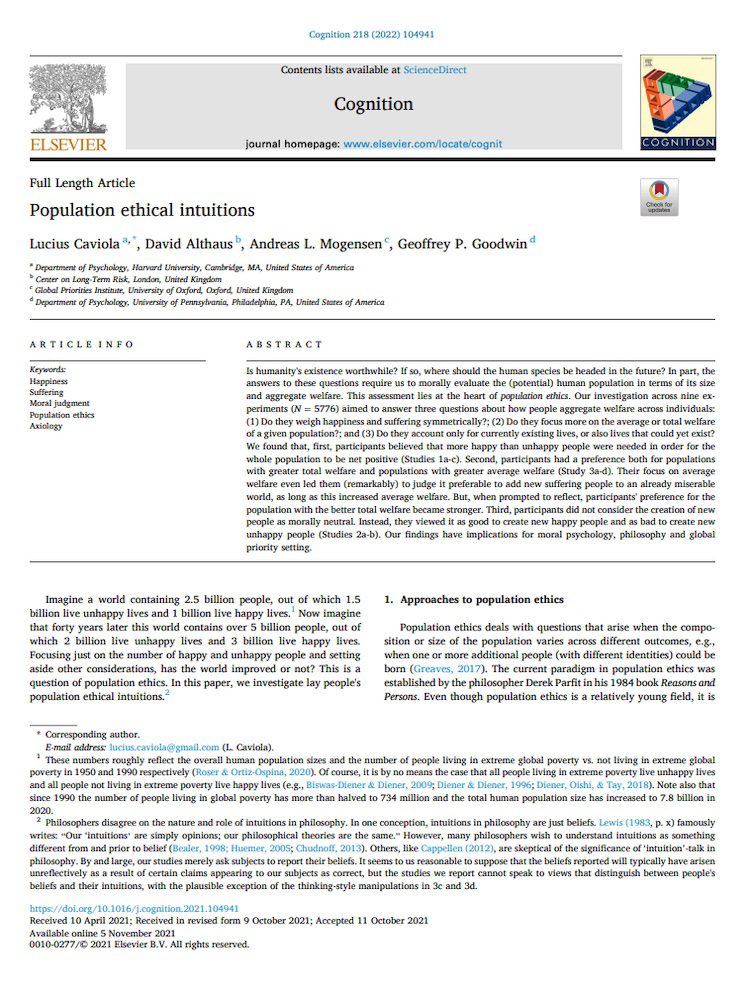Population ethical intuitions
Lucius Caviola (Harvard University), David Althaus (Center on Long-Term Risk), Andreas Mogensen (Global Priorities Institute, University of Oxford) and Geoffrey Goodwin (University of Pennsylvania)
GPI Working Paper No. 3-2024, published in Cognition
Is humanity's existence worthwhile? If so, where should the human species be headed in the future? In part, the answers to these questions require us to morally evaluate the (potential) human population in terms of its size and aggregate welfare. This assessment lies at the heart of population ethics. Our investigation across nine experiments (N = 5776) aimed to answer three questions about how people aggregate welfare across individuals: (1) Do they weigh happiness and suffering symmetrically?; (2) Do they focus more on the average or total welfare of a given population?; and (3) Do they account only for currently existing lives, or also lives that could yet exist? We found that, first, participants believed that more happy than unhappy people were needed in order for the whole population to be net positive (Studies 1a-c). Second, participants had a preference both for populations with greater total welfare and populations with greater average welfare (Study 3a-d). Their focus on average welfare even led them (remarkably) to judge it preferable to add new suffering people to an already miserable world, as long as this increased average welfare. But, when prompted to reflect, participants' preference for the population with the better total welfare became stronger. Third, participants did not consider the creation of new people as morally neutral. Instead, they viewed it as good to create new happy people and as bad to create new unhappy people (Studies 2a-b). Our findings have implications for moral psychology, philosophy and global priority setting.
Other working papers
Once More, Without Feeling – Andreas Mogensen (Global Priorities Institute, University of Oxford)
I argue for a pluralist theory of moral standing, on which both welfare subjectivity and autonomy can confer moral status. I argue that autonomy doesn’t entail welfare subjectivity, but can ground moral standing in its absence. Although I highlight the existence of plausible views on which autonomy entails phenomenal consciousness, I primarily emphasize the need for philosophical debates about the relationship between phenomenal consciousness and moral standing to engage with neglected questions about the nature…
Dispelling the Anthropic Shadow – Teruji Thomas (Global Priorities Institute, University of Oxford)
There are some possible events that we could not possibly discover in our past. We could not discover an omnicidal catastrophe, an event so destructive that it permanently wiped out life on Earth. Had such a catastrophe occurred, we wouldn’t be here to find out. This space of unobservable histories has been called the anthropic shadow. Several authors claim that the anthropic shadow leads to an ‘observation selection bias’, analogous to survivorship bias, when we use the historical record to estimate catastrophic risks. …
Estimating long-term treatment effects without long-term outcome data – David Rhys Bernard (Rethink Priorities), Jojo Lee and Victor Yaneng Wang (Global Priorities Institute, University of Oxford)
The surrogate index method allows policymakers to estimate long-run treatment effects before long-run outcomes are observable. We meta-analyse this approach over nine long-run RCTs in development economics, comparing surrogate estimates to estimates from actual long-run RCT outcomes. We introduce the M-lasso algorithm for constructing the surrogate approach’s first-stage predictive model and compare its performance with other surrogate estimation methods. …

